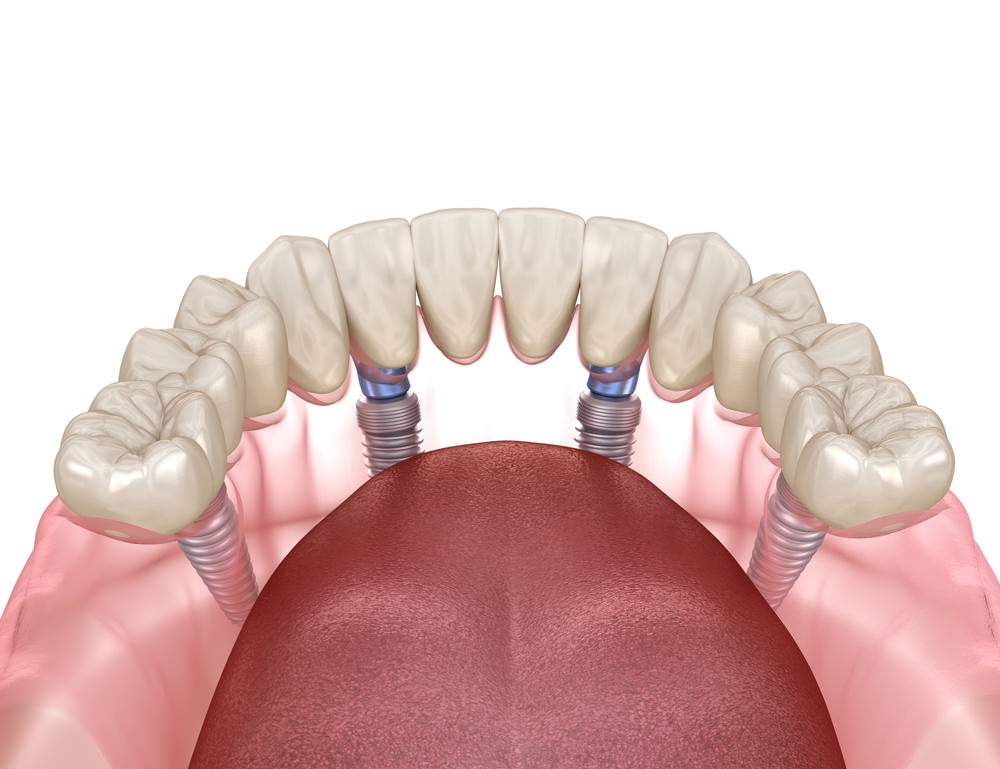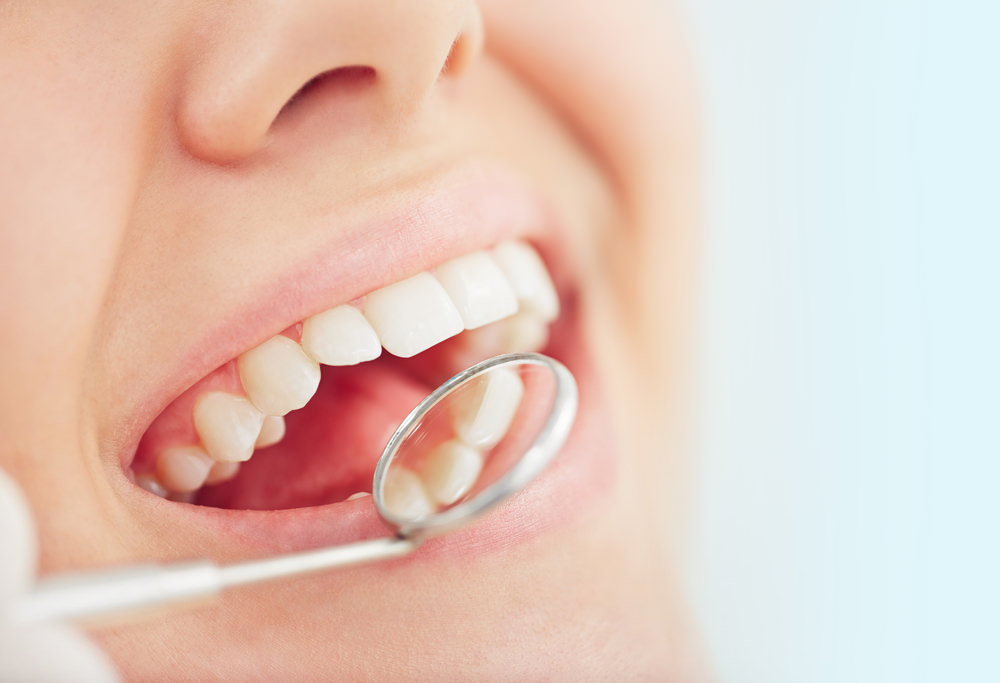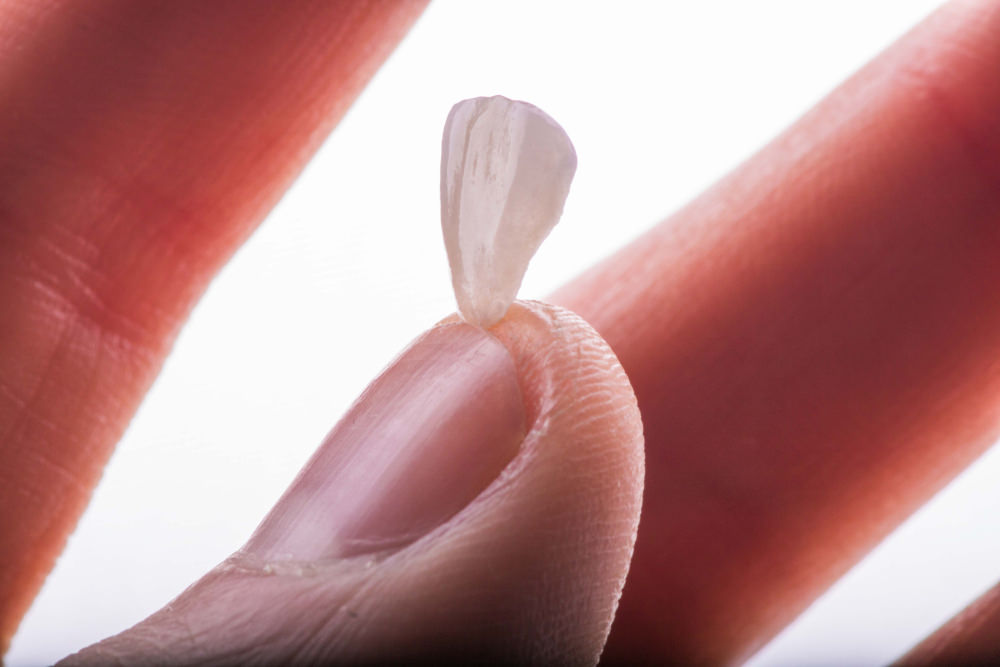All on 4 Dental Implants – Advantages and Disadvantages Disscussed
If you have been looking at the different options available for full tooth replacements, “All on 4” is one of the options.
The other options are to have more than 4 implants which then can have a ceramic and metal bridge placed or you may want to just get used to wearing an acrylic full denture.
Jump to Content
- What Does “All on 4” Mean?
- Are All on 4 Comfortable?
- Advantages and Disadvantages of “All on 4”
- What is the Cost of All on 4?
- Pros and Cons of All on 4 Implants
- Risks of All on 4 Implants
- Can All on 4 be Removed?
- Can the Procedure be Painful?
- All on 4 Treatment Options Overseas
- All on 4 Reviews in Australia
- Recovery Time to Consider Once Treatment is Completed
- Conclusion
What Does “All on 4” Mean?
All on 4 is an entire set of teeth (acrylic denture) that rests on four dental implants.
The acrylic denture associated with implants is designed in a way that we can minimize the coverage of the palate that a full denture requires for vacuum and suction.
The acrylic removable denture on implants can be designed so that the forces of the bite can be distributed to the implants and not be extended to use the support of the surrounding bone.
All on 4 implants, you can replace your full denture immediately, restoring a whole set of teeth with only four implants per arch.
The procedure for All on 4 is quick, and cost-effective, with a high success rate according to the surgeons who have perfected this technique.
Are All on 4 Comfortable?
All on 4 are also commonly called “Teeth in a Day” but there is surgery involved and as with all surgeries there is a recovery time. Since pain is subjective your health and recovering time is subjective.
If the procedure is performed correctly, with the proper combination of materials, the end result is:
- Aesthetically appealing.
- Functional.
- Comfort level is dependent on each individual case.
All on 4 implants dentures may be more comfortable as the forces of the bite are borne by the implants and not rubbing on the gums.
Depending on the design of the dentures, your prosthetic appliance may be made so that minimal coverage of the palate and jaws can be achieved making speech and eating closer to your own teeth.
Every effort is made so that the design can be made as close as possible to allow swallowing and eating and minimizing the rubbing and pressure sores on the gums.
Advantages of “All on 4”
- They do not apply pressure to your gums.
- Are a permanent fixture. This means that they do not move and slip around in your mouth when eating, speaking, or exercising.
- Maintain and support your facial features, including the volume and quality of your jaw bone, as your natural teeth would.
- May operate and feel just like your normal teeth in due time.
- Restore your range of chewing motions, so you will be able to eat most foods.
Disadvantages of “All on 4”
- All 4 implants must be balanced as if more force is placed on a single or more implants then the implants may fail. If any implants fail then the forces of the bite are unbalanced placing more force on the remaining implants.
- Since the bite will be supported by the implants (and therefore stronger than you could bite with a full denture) the force of the bite can be stronger; which may break the denture or break one of the implants.
- The implants do not have the same flexibility and movement as teeth do so if the bite is strong, or you clench or grind the teeth then excessive forces may affect the longevity of the “All on 4”
- The design will also guide how effective the cleaning of the appliance is. The appliance must be able to be cleaned well just like teeth. So if the age of the patient is mature: arthritis, rheumatism or low flexibility may hamper your cleaning efforts. This may set up inflammation around the implants. Inflammation and inability to debride around the implants could cause bone loss and ultimate failure of the implants.
- Getting used to the material in the appliance is borne better by some people and not by others. This must be thoroughly discussed and all factors put into effect until you get used to the new appliance.
What is the Cost of All on 4?
As is the case with all dental work, the cost of your “All on 4” will depend upon your requirements. Such as materials that you choose, and also on the operator’s requirements.
There are no set fees for such dental work. It is advisable to choose an operator according to their training, experience and back up support.
In Australia, the costs generally range between $23, 000 to $27,000 per fixed arch. These prices are generally inclusive of:
- Your initial consultation with models and x-rays.
- All the procedures that you need prior to surgery.
- The surgery itself.
- The positioning of an acrylic denture.
- All necessary appointments/assessments that you need after surgery, including x-rays.
What Are the Pros and Cons of All on 4 Implants
Like all dental treatments, “All on 4” is an option for restoring your dentition. “All on 4” can often be called “All on 4 Dentures”.
Dentures are normally removable but if secured to the implants you can not remove the dentures for cleaning. The new dentures are secured onto the four implants which now can be made permanent (ie not able to be removed for cleaning).
There are 13 benefits that come with “All on 4” these include:
13 Benefits with All on 4
- Less time is needed to fit them than other dental implants.
- The procedure is not as invasive as others.
- Often no need for bone grafting.
- They can also work on those that only have a minimum amount of jawbone.
- “All on 4” are suited for those who have health conditions such as Alzheimer’s and other degenerative mental conditions who have problems with removable dentures.
- They may help to stop further bone loss due to pressure of bone supported dentures.
- They may make your jawbone stronger by applying a demand on bone remodelling.
- All on 4 implants give you a full-arch restoration.
- They increase your oral health by not covering up most of the soft tissue areas of your mouth.
- Since the forces are supported by implants eventually the sensation of your bite may feel as your own teeth did.
- In comparison to other choices you have for full-arch restorations, such as crown and bridgework. Ultimately the cost in proportion is less.
- Coverless soft tissue and less palate so that the taste and texture of food can be felt.
- Are less uncomfortable than other options you may have to replace your teeth, such as dentures.
The greatest advantage is that with planning and protocol it may be completed in just one day. As the surgery and fitting of the appliance may be achieved in advance. Some operators may be able to remove your teeth and place the implants so that you do not spend any time being without teeth.
This results in increased self-confidence with your smile and can reduce the risk of dental problems. Since your teeth will no longer have maintenance and cleaning.
The surgery is planned in advance with dental guides for the implants and can be done with minimal invasion. This may lead to a quicker recovery if there are no complicating factors.
Because these implants work like normal teeth you are likely to have a stronger natural bite, making it easier for you to chew.
In terms of dental hygiene and care, continue with your daily oral hygiene, just as you do your natural teeth.
Factors which influence the final outcome of your “All on 4”:
• Your age.
• Your health.
• If you take care of them i.e. brush and floss correctly and regularly.
• The standard of your implants.
9 Risks to Be Aware of with All on 4 Implants
- Side-effects from surgery
- Partial or complete failure
- Speech problems
- Complications when getting used to the new appliance
- The texture of the appliance may not be able to be tolerated
- The soft tissue will be artificial and hard (that is, the tissue part of the bridge)
- The transition from natural teeth to a denture
- Proprioception
- An inexperienced surgeon complications
Side effects can include infection, poor healing, discomfort or substantial bleeding. Though uncommon, your “All on 4” implants may not succeed.
Typical factors that cause this are:
- Smoking, as this will impede your healing process.
- Deficient bone density.
- Substandard nutrition.
- Pre-existing health conditions.
- Not taking proper care of your oral health following the treatment.
- Teeth grinding, (this mostly affects their lifespan). You had 16 teeth in one arch to support your bite. Now your bite is supported by only 4 implants per arch. So grinding and clenching may affect the strength and longevity of the implants due to excessive forces.
You may have speech issues because the vertical height of the implants may be bigger than your actual bone and soft-tissue that was removed.
“All on 4” can affect your speech sounds, especially “D”, “T”, “N” and “S”. A consequence of this may be slurred speech.
Given time, patients can often retrain their tongues, and so their speech. But this is something that can cause them to be anxious in the meantime.
You may ask your dentist to issue an appliance such as a clear mouth guard so that you can practice tolerating having plastic in your mouth. With a plastic mouthguard, you can practice speech and see how your mouth can tolerate something foreign.
If your confidence is in question it is important to discuss with the dentist other treatment options. You may choose to have individual implants and/or segmented bridges made from metal and porcelain. This will greatly reduce the size of the final appliance and reduce some of these side effects.
However, you must be prepared for the extra treatment time and cost these will require. The bulkiness of the bridge may be another downfall and it could take time to get used to it. You may train yourself with a denture and then ultimately build-up to “All on 4”.
Mentally and emotionally it may be difficult for people to adjust to the difference in the feel of the “All on 4” denture as you have had your teeth all of your life. The nerves in the mouth know the position of your jaw and how hard you can bite. When you lose your natural teeth you also lose your proprioception and the nerve supply of your mouth.
When an “All on 4” has been fitted, you may feel the following:
- The acrylic bulkiness of the denture and the slope of the teeth
- The artificial soft tissue (that is, the tissue part of the bridge)and the gap where it fits to the jaw bone
- It is very different from your natural teeth so you must be prepared.
This can be a real issue for some people, and one that is only figured out after surgery when their ridge may already be shortened. By then, there is nothing that can be done to bring back that natural feeling.
Proprioception is the perception or recognition of the position and motion your body is making. The significance of this is often underestimated.
The periodontal mechanoreceptors (PMRs) that exist in a periodontal ligament are not in implants such as “All on 4”. These PMRs make teeth sensitive to small exertions.
An “All on 4” may need roughly 10 times more force to detect the proprioception as a normal tooth. A normal tooth can feel a grain of sand where the artificial teeth do not.
This is comparable to that of a tooth that is under the influence of a local anaesthetic. This means that patients will find it difficult to perceive when they are biting impulsively or excessively.
A repercussion of this can be fractures of the “All on 4” implants or bone loss. So preparation for this procedure is mandatory and you must begin to have only a soft diet initially. Slowing working up to a harder food diet.
You must speak to your surgeon and dentist about this factor as this could cause your bridge to break. These factors can be greatly reduced with planning and preparation:
Ensure that your dentist has discussed:
- Plans and options of treatment thoroughly.
- Supplies you with a nightguard.
- It can also mean poorly placed implants, which, as well as affecting the way you speak, can cause:
- The healing process to be slow.
- A substandard aesthetic result.
- Your teeth not feeling ‘good’ and ‘proper’ in your mouth.
Picking a dentist that has many years of general or specialised dental experience is an added benefit that will create some peace of mind when going through “All on 4” dental implants.
Read about how to research your surgeon and prevent this from happening under the sub-heading, “Can the Procedure be Painful”.
- They would move and slip around.
- Chaffing the mouth.
- Need to constantly be re-fitted.
Unlike traditional dentures, “All on 4” offer another option and that is permanent placement. They are fitted to the bone of your jaw, acting as secure anchors for your dentures.
The advantages of this are no more slipping or chaffing, taking out to clean, or removing at night when you sleep. As they are a permanent fixture, there is no need for your “All on 4” to be removed.
The only person who can actually remove your All on 4’s is your Dentist.
Can the Procedure be Painful?
The procedure for All on 4 should not be extremely painful.
Firstly, there is a range of sedation and pain medication which your dentist will recommend what is best suited to you. These include:
- General anaesthetic (which will put you fully to sleep).
- IV sedation (where you are in a “twilight sleep”, and will feel no pain).
This helps to make sure that the operation is as comfortable and painless for you as possible.
Secondly, Dentists who offer an “All on 4” treatment must have undergone extensive training and experience. A dentist trained will also ensure your safety and your comfort.
The experience of the surgeon who is performing your “All on 4” surgery is perhaps the most important, influencing deciding factor as to whether your treatment will succeed or fail. This is a very advanced procedure, and Dentists’ do not learn about it at dental school.
Being able to discuss this detail with your dentist will ensure that you have confidence in your operator.
Things to check and make sure that they have sufficient and mandatory training, and have performed this surgery successfully whilst under supervision.
The “All on 4” procedure was established over 10 years ago. Do your research before you proceed. Since this procedure has only been performed for 10 years it may be too early to call for long term success. So as with any dental technique, every effort is made to ensure the safety and comfort of the patient.
But it is one option better than wearing a denture and having to go through the agony of slowly losing your teeth.
Once you have done your research and decided that this option is for you. You need to research your dentist/surgeon and meet them.
As with any dental surgery, the “All on 4” you can expect to feel some discomfort after the numbness from sedation wears off.
The days following your surgery may require medication so it may be an idea to take time from work or other duties and to just rest so that your body is given the appropriate time to heal.
You may also experience the following:
- Bleeding (typically very little, if any at all).
- Swelling (this has happened to roughly half of those who have undertaken the procedure).
- Bruising (this happens in approximately 10% of cases).
Though, your Dentist will send you home with some special prescribed medication (painkillers). These will help to reduce any soreness you feel, so you maintain a level of comfort over these few days.
All on 4 Treatment Options Overseas
All on 4 treatments are available in many overseas countries, such as Thailand, Bali, Vietnam and India.
Prices do range quite substantially from $12,000 – $16,000 AUD in Thailand.
Bali you can expect to pay on average between $19,655 to $24,035AUD.
Vietnam is more expensive coming in at $20885 to $34,808AUD.
Though these prices may be less expensive, is it worth it?
You may get a treatment that is rushed, and as such, you may not receive proper planning or follow-up appointments, including the x-rays of your final teeth. This could potentially lead to poorly placed implants and the breaking of your bridge.
Dental Costs Thailand – The Definitive Guide has the answers to why people travel overseas for Dentistry, and what you are risking by doing so.
All on 4 Reviews in Australia
If you want to see patients giving reviews about their experience with All on 4’s in Australia, I recommend checking out the below websites:
They have some videos containing fantastic interviews with patients, discussing their procedure and how it benefitted them.
If you would prefer to see some “Before and After” pictures, visit Macquarie Street Dental.
Is There A Recovery Time to Consider Once Treatment is Completed?
As the treatment for “All on 4” is only marginally invasive, and if there is no bone grafting, the recovery time is less than that of traditional dental implants.
Most people can start going back about their normal daily tasks within 3 to 4 days.
Within these first few days, you can expect to feel some level of tenderness, pain, and inflammation. But if you experience extreme soreness and pain, you should contact your dentist/surgeon immediately
.
Your Dentist will probably also advise you to adjust your diet post-operatively.
Though your new teeth will be strong and secure, this will help to ensure that they last for as long as possible. The bone must be trained to accept the new forces. So a very soft diet initially until your bone heals around the implants.
Your post-surgery diet should be as follows:
In the first few days after surgery, you will be instructed to consume liquid foods only.
Then, after 4 or so days, you will be told you can start eating soft foods, such as eggs, fish and pasta. Your Dentist will ask you to not eat hard food for up to 3 months or even longer.
They may provide you with a list of foods that are appropriate, and recipes to match, your dentist will know the quality and quantity of your bone and will advise you accordingly.
After approximately 3 months, your Dentist will assess your “All on 4” implants. Integration into the bone and assimilation with the gums is inspected.
Though most people find that their “All on 4” fit their bite and you have assimilated well. However, if your dentist finds that adjustments are required, they will discuss these throughout your follow up appointments.
By the 6-month mark, the majority of people who have undertaken an “All on 4” treatment usually recover well
Conclusion
I hope this article has been helpful and explanation regarding the “All of 4” has answered any questions you may have.
So, if you are intrigued, and want to know if you are an ideal candidate, the best person that you can speak to is your Dentist.
But to sum it up, your prospects are good if you have badly decayed teeth, teeth that have deteriorated or teeth that are suffering from severe gum disease.
If you are normally an unsuitable candidate for dental implants due to health conditions such as diabetes, osteoporosis, or you are a smoker. It may be beneficial for you to wear a denture first until you get used to the feel and taste of the acrylic.
What are your thoughts on All on 4 implants?
By Dr. V
Created at January 07, 2021, Updated at January 25, 2025





